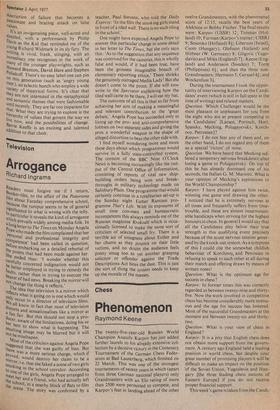T elevision
Arrogance
Richard Ingrams
Readers must forgive me if I return, 800ker-like, to the affair of the Panorama film about Faraday comprehensive school, b.ecause the rumpus seems to be of general s,Ignificance to what is wrong with the telly. in Particular it reveals the kind of arrogance which prevails widely among media folk. In ong letter to The Times on Monday Angela , Pope who made the film complained that her Personal and Professional integrity and cremPetence' had been called in question, before embarking on a detailed rebuttal of ,t1-1e Points that had been made against her. She ended thus: 'I wonder whether this carefully concerted indignation would not be better employed in trying to remedy the f auks, rather than in trying to execute the bearer of bad news. Breaking the mirror will riot change the thing it reflects.' The idea that television is a mirror which reflects what is going on is one which would only occur to a director of television films. all know in fact that most of television distorts and sensationalises like a mirror at a fun fair. But this should not stop a producer, 1.Icer, aware of the limitations, doing his or her best to show what is happening. The resulting image may be blurred but it will not be misshapen.
Most of the criticism against Angela Pope suggested that she was guilty of bias. But there was a more serious charge, which if Proved, would destroy her claim to be a mirror, i.e. that she faked a scene of two girls smoking in the school corridor. According to one of the girls, Angela Pope arranged to the her and a friend, who had actually left the school, in a nearby block of flats to film the scene. The story was confirmed by a
teacher, Paul Stevens, who told the Daily Express: 'In the film the smoking girIS stand in front of a tiled wall. There is no such tiling in the school.'
One might have expected Angela Pope to answer this particular charge in some detail in her letter to The Times, but she only says this: 'As to the suggestion that any sequence was contrived for the cameras, this is wholly false and would, if it had been true, have been the grossest imaginable breach of elementary reporting ethics.' There shrieks the genuinely outraged Media Lady! But she doesn't come to the point. If she will now write to the Spectator explaining how the tiled wall came to be there, I will eat my hat.
The outcome of all this is that so far from achieving her aim of making a meaningful and relevant contribution to the 'great debate,' Angela Pope has succeeded only in lining up the proand anti-comprehensive lobbies on two separate sides and giving the pros a wonderful weapon in the shape of alleged distortion to beat the other side with.
I find myself wondering more and more these days about which programmes would survive in a fully state-controlled system. The content of the BBC Nine O'Clock News is becoming increasingly like the output of the Central Office of Information, consisting of reports of vital new shipbuilding orders being won and breakthroughs in military technology made on Salisbury Plain. One programme that would certainly continue in a totalitarian set-up is the Sunday night Esther Rantzen programme That's Life. With its exposures of small time con-men and bureaucratic incompetents this always reminds me of the Russian magazine Krokodil which is occasionally licensed to make the same sort of criticism of selected small fry. There is a terrible air of smugness about Esther and her chums as they pounce on their little victims, and no doubt the audience feels pretty smug too as yet another grasping solicitor or offender against the Trade Descriptions Act bites the dust. This is just the sort of thing the system needs to keep up the morale of the masses.






































 Previous page
Previous page